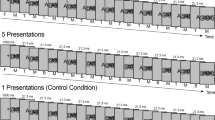Summary
What is the duration of the influence of information perceived without awareness? Some studies suggest a duration of only a few seconds whereas others suggest a duration of hours, days, or weeks. To further investigate this question, we used a variant of the inattentional blindness paradigm (Mack & Rock, 1998). In three experiments, participants viewed briefly presented visual displays consisting of both a centrally located word and a peripherally located cross with unequal vertical and horizontal arms. Awareness of the words was varied by requiring participants either to read the word and then judge which arm of the cross was longer, or the reverse. Perception of the words was assessed using three-letter stems (e.g., pho_ __) of each word (e.g., phone), with participants instructed to complete the stem to make any word other than one previously presented. Success in following the instructions indicates that a word was perceived with awareness; failure indicates that a word was perceived without awareness. Memory for information perceived without awareness lasted for at least 32 minutes, and was strong following all retention intervals. These findings are consistent with previous studies suggesting that memory for information perceived without awareness can last for hours or days.
Access this chapter
Tax calculation will be finalised at checkout
Purchases are for personal use only
Preview
Unable to display preview. Download preview PDF.
Similar content being viewed by others
References
Bogetz, M. S., & Katz, J. A. (1984). Recall of surgery for major trauma. Anesthesiology, 61, 6–9.
Chalmers, D. J. (1996). The conscious mind. New York: Oxford University Press.
Cheesman, J., & Merikle, P. M. (1986). Distinguishing conscious from unconscious perceptual processes. Canadian Journal of Psychology, 40, 343–367.
Debner, J. A., & Jacoby, L. L. (1994). Unconscious perception: Attention, awareness, and control. Journal of Experimental Psychology: Learning, Memory, and Cognition, 20, 304–317.
Greenwald, A. G., Draine, S. C., & Abrams, R. L. (1996). Three cognitive markers of unconscious semantic activation. Science, 273, 1699–1702.
Holender, D. (1986). Semantic activation without conscious identification in dichotic listening, parafoveal vision, and visual masking: A survey and appraisal. Behavioral and Brain Sciences, 9, 1–23.
Hutchings, D. D. (1961). The value of suggestion given under anesthesia: A report and evaluation of 200 consecutive cases. American Journal of Clinical Hypnosis, 4, 26–29.
Kouider, S., & Dupoux, E. (2004). Partial awareness creates the “illusion” of subliminal semantic priming. Psychological Science, 15, 75–81.
Levinson, B. W. (1965). States of awareness during general anaesthesia. British Journal of Anaesthesia, 37, 544–546.
Lubke, G. H., Kerssens, C., Phaf, H., & Sebel, P. H. (1999). Dependence of explicit and implicit memory on hypnotic state in trauma patients. Anesthesiology, 90, 670–680.
Mack, A., & Rock, I. (1998). Inattentional blindness. Cambridge, MA: MIT Press.
Merikle, P. M. (1992). Perception without awareness: Critical issues. American Psychologist, 47, 792–795.
Merikle, P. M., & Daneman, M. (1996). Memory for unconsciously perceived events: Evidence from anesthetized patients. Consciousness and Cognition, 5, 525–541.
Merikle, P. M., & Joordens, S. (1997). Parallels between perception without awareness and perception without attention. Consciousness and Cognition, 6, 219–236.
Merikle, P. M., Joordens, S., & Stolz, J. A. (1995). Measuring the relative magnitude of unconscious influences. Consciousness and Cognition, 4, 422–439.
Merikle, P. M., Smilek, D., & Eastwood, J. D. (2001). Perception without awareness: Perspectives from cognitive psychology. Cognition, 79, 115–134.
Pearson, R. E. (1961). Response to suggestion given under general anesthesia. American Journal of Clinical Hypnosis, 4, 106–114.
Reingold, E. M., & Merikle, P. M. (1990). On the inter-relatedness of theory and measurement in the study of unconscious processes. Mind & Language, 5, 9–28.
Sidis, B. (1898). The psychology of suggestion. New York: D. Appleton.
Author information
Authors and Affiliations
Editor information
Editors and Affiliations
Rights and permissions
Copyright information
© 2005 Springer-Verlag Tokyo
About this chapter
Cite this chapter
Merikle, P.M., Smith, S.D. (2005). Memory for Information Perceived Without Awareness. In: Ohta, N., MacLeod, C.M., Uttl, B. (eds) Dynamic Cognitive Processes. Springer, Tokyo. https://doi.org/10.1007/4-431-27431-6_5
Download citation
DOI: https://doi.org/10.1007/4-431-27431-6_5
Publisher Name: Springer, Tokyo
Print ISBN: 978-4-431-23999-4
Online ISBN: 978-4-431-27431-5
eBook Packages: Behavioral ScienceBehavioral Science and Psychology (R0)




